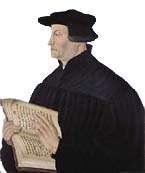| Перевод этой страницы на Ваш язык отсутствует, поэтому Вам предлагается английский вариант. Выше Вы можете выбрать перевод этой страницы на один из других языков Huldreich Zwingli (1484-1531) Главное меню > Tourist Guide > Table of contents > Swiss culture > Religions > Protestantism > Huldreich Zwingli  For Switzerland, Huldreich Zwingli has always been more than a dynamic theologian - he was also an energetic politician and patriotic statesman with a feisty spirit who left his mark on history. After studying in Basle, Bern and Vienna, this son of a free peasant of Toggenbourg became a parish priest in Glarus (1506-1516), and then a chaplain in Einsiedeln (1516-1518) and, in the meantime, also chaplain of the Confederate during the Italian campaigns in 1513 (battle of Novara) and in 1515 (battle of Marignano). This paramilitary activity led the politician and patriot Zwingli to categorically oppose mercenariness and adhere to politics beyond the realm of conquest. He dreamt of a more coherent Confederation, geared towards an ideal of moderation and simplicity (Nicolas of Flue), a country in which every citizen lived off the fruit of the land and loyally exalted his own zeal. Of course, at this time Zwingli was still a son of the Catholic Church, who was critical and perceptive, but loyal and devoted to the essential issues. In 1518, he was ordained a papal acolyte (one of the highest minor orders), for which he received a pension. For Switzerland, Huldreich Zwingli has always been more than a dynamic theologian - he was also an energetic politician and patriotic statesman with a feisty spirit who left his mark on history. After studying in Basle, Bern and Vienna, this son of a free peasant of Toggenbourg became a parish priest in Glarus (1506-1516), and then a chaplain in Einsiedeln (1516-1518) and, in the meantime, also chaplain of the Confederate during the Italian campaigns in 1513 (battle of Novara) and in 1515 (battle of Marignano). This paramilitary activity led the politician and patriot Zwingli to categorically oppose mercenariness and adhere to politics beyond the realm of conquest. He dreamt of a more coherent Confederation, geared towards an ideal of moderation and simplicity (Nicolas of Flue), a country in which every citizen lived off the fruit of the land and loyally exalted his own zeal. Of course, at this time Zwingli was still a son of the Catholic Church, who was critical and perceptive, but loyal and devoted to the essential issues. In 1518, he was ordained a papal acolyte (one of the highest minor orders), for which he received a pension.This was also a time of philosophical fulfillment for Zwingli. Through written correspondence and a network of friends, he entered into the very active intellectual circle of Swiss humanists who unanimously considered their hero to be Didier Erasmus of Rotterdam, who had settled in Basle. The humanist doctrine, the fruitful analysis of the writings and teachings of Luther, the painful personal experience of the plague, which, by the grace of God he managed to escape, all made Zwingli a resolute reformer. Zwingli’s novelty lay mainly in his attitude with regard to temporal power. According to Luther, everyone is subject to this power, incontestably, because it is the will of God and, what is more, it does not take into account salvation of the human soul. Contrary to this, Zwingli stressed, in an initial stage, the unconditional autonomy of all ecclesiastical communities in the face of state power. More resolutely than Luther, he assigned moral obligations to the public powers, who were to try to model their laws as best as possible to God’s law. Moreover, they were to educate and protect. This feature of Zwingli’s doctrine was the root of a tolerant republican administration, based on morality and the fear of God, the true government to which authorities were to accede. Within a few years, he broke the ties that bound Zurich to the Catholic Church and then concentrated on the propagation and protection of the Reformation on Swiss soil. His theological influence on the canton-cities that ascribed to the Reformation was predominant, but his political aims – reorganization of the Confederation under the aegis of Protestantism – met with passive resistance, particularly on the part of the Bernese powers. And yet an imperishable work remains: Zwingli’s Protestanism, a faith marked by resolute albeit bare morality, a denominational style typical of Protestant German Switzerland.
|
| © Micheloud & Cie 2013 Tel. ++41 21 331 48 48 info@switzerland.isyours.com. ??????? ????? ????? ????? ?? ????? ???? ?????????????? ? ?????-???? ????? ??? ?????? ???????????????? ??????????? ??????????. Печать из http://Switzerland.isyours.com/r/putevoditel/religiji/hristianstvo/zwingli.html |